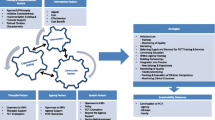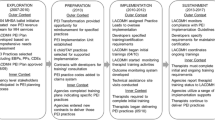Abstract
This study examined rates of sustainability, defined as program continuation, and factors associated with sustainability 6 years after full implementation of five evidence-based practices in 49 sites in the National Implementing Evidence-Based Practices Project. Based on interviews with agency leaders and state leaders, 47 % of sites sustained the practice for 6 years, 16 % restarted the practice after a period of discontinuation, and 37 % discontinued the practice permanently. Agency leaders from discontinuing sites identified inadequate financial support, lack of prioritization, and workforce issues as barriers to continuation. Adequate financing, ongoing supervision, and monitoring of fidelity and outcome may promote long-term sustainability.
Similar content being viewed by others
References
Atlas.ti 2.0. (2002). Atlas.ti 2.0 [Computer software]. Berlin, Germany: GmbH.
Bond, G. R., Drake, R. E., & Becker, D. R. (2012). Generalizability of the individual placement and support (IPS) model of supported employment outside the US. World Psychiatry, 11, 32–39.
Bond, G. R., McHugo, G. J., Becker, D. R., Rapp, C. A., & Whitley, R. (2008). Fidelity of supported employment: Lessons learned from the National Evidence-Based Practices Project. Psychiatric Rehabilitation Journal, 31, 300–305.
Brown, J. D., Barrett, A., Ireys, H., Caffery, E., & Hourihan, K. (2012). Evidence-based practices for Medicaid beneficiaries with schizophrenia and bipolar disorder. Washington, DC: Office of Disability, Aging and Long-Term Care Policy, Office of the Assistant Secretary for Planning and Evaluation, U.S. Department of Health and Human Services.
Brunette, M. F., Asher, D., Whitley, R., Lutz, W. J., Wieder, B. L., Jones, A. M., et al. (2008). Implementation of integrated dual disorders treatment: A qualitative analysis of facilitators and barriers. Psychiatric Services, 59, 989–995.
Damschroder, L. J., & Hagedorn, H. J. (2011). A guiding framework and approach for implementation research in substance use disorders treatment. Psychology of Addictive Behaviors, 25, 194–205.
Fixsen, D. L., Naoom, S. F., Blase, K. A., Friedman, R. M., & Wallace, F. (2005). Implementation research: A synthesis of the literature. Tampa, FL: University of South Florida.
Greenhalgh, T., Robert, G., MacFarlane, F., Bate, P., & Kyriakidou, O. (2004). Diffusion of innovations in service organizations: Systematic review and recommendations. Milbank Quarterly, 82, 581–629.
Karakus, M., Frey, W., Goldman, H., Fields, S., & Drake, R. (2011). Federal financing of supported employment and customized employment for people with mental illnesses: Final report (Prepared for Office of Disability, Aging and Long-Term Care Policy Office of the Assistant Secretary for Planning and Evaluation U.S. Department of Health and Human Services Contract #HHSP23320095655WC). Rockville, MD: Westat.
Landis, J. R., & Koch, G. G. (1977). The measurement of observer agreement for categorical data. Biometrics, 33, 159–174.
Latimer, E. (1999). Economic impacts of assertive community treatment: A review of the literature. Canadian Journal of Psychiatry, 44, 443–454.
Mancini, A. D., Moser, L. L., Whitley, R., McHugo, G. J., Bond, G. R., Finnerty, M. T., et al. (2009). Assertive community treatment: Facilitators and barriers to implementation in routine mental health settings. Psychiatric Services, 60, 189–195.
Massatti, R. R., Sweeney, H. A., Panzano, P. C., & Roth, D. (2008). The de-adoption of innovative mental health practices (IMHP): Why organizations choose not to sustain an IMHP. Administration and Policy in Mental Health and Mental Health Services Research, 35, 50–65.
McHugo, G. J., Drake, R. E., Whitley, R., Bond, G. R., Campbell, K., Rapp, C. A., et al. (2007). Fidelity outcomes in the National Implementing Evidence-Based Practices Project. Psychiatric Services, 58, 1279–1284.
Mueser, K. T., Corrigan, P. W., Hilton, D. W., Tanzman, B., Schaub, A., Gingerich, S., et al. (2002). Illness management and recovery: A review of the research. Psychiatric Services, 53, 1272–1284.
Rogers, E. M. (2003). Diffusion of innovations (5th ed.). New York: Free Press.
Shediac-Rizkallah, M. C., & Bone, L. R. (1998). Planning for the sustainability of community-based health programs: Conceptual frameworks and future directions for research, practice and policy. Health Education Research, 13, 87–108.
Swain, K., Whitley, R., McHugo, G. J., & Drake, R. E. (2010). The sustainability of evidence-based practices in routine mental health agencies. Community Mental Health Journal, 46, 119–129.
Torrey, W. C., Bond, G. R., McHugo, G. J., & Swain, K. (2012). Evidence-based practice implementation in community mental health settings: The relative importance of key domains of implementation activity. Administration and Policy in Mental Health and Mental Health Services Research, 39, 353–364.
Torrey, W. C., Lynde, D. W., & Gorman, P. (2005). Promoting the implementation of practices that are supported by research: The National Implementing Evidence-Based Practices Project. Child and Adolescent Psychiatric Clinics of North America, 14, 297–306.
Whitley, R., Gingerich, S., Lutz, W., & Mueser, K. T. (2009). Implementing the illness management and recovery program in community mental health settings: Facilitators and barriers. Psychiatric Services, 60, 202–209.
Wiltsey Stirman, S., Kimberly, J., Cook, N., Calloway, A., Castro, F., & Charns, M. (2012). The sustainability of new programs and innovations: A review of the empirical literature and recommendations for future research. Implementation Science, 7, 17. doi:10.1186/1748-5908-1187-1117.
Acknowledgments
This study was funded in part by SAMHSA Contract 283-07-4005. We thank the many site leaders and state leaders who agreed to be interviewed and who provided thoughtful responses. We also thank our project officer, Kevin Hennessy, Ph.D., Science to Service Coordinator, Substance Abuse and Mental Health Services Administration, for his helpful comments and suggestions during the course of this project.
Author information
Authors and Affiliations
Corresponding author
Rights and permissions
About this article
Cite this article
Bond, G.R., Drake, R.E., McHugo, G.J. et al. Long-Term Sustainability of Evidence-Based Practices in Community Mental Health Agencies. Adm Policy Ment Health 41, 228–236 (2014). https://doi.org/10.1007/s10488-012-0461-5
Published:
Issue Date:
DOI: https://doi.org/10.1007/s10488-012-0461-5




